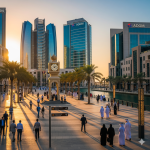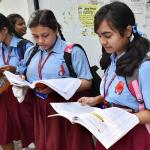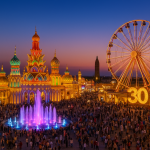The United Arab Emirates is synonymous with sunshine. With over 340 days of sun a year, the climate is one of the main reasons so many expats are drawn to this vibrant country. The warm weather is perfect for enjoying the beaches, pool days, and endless outdoor activities. However, the relentless sun and intense heat, especially during the long summer months, present a unique set of health challenges.
Adapting to the desert climate is a crucial part of a successful expat experience. Ignoring the risks of sun exposure and heat can lead to a range of health issues, from minor dehydration to serious heatstroke. This guide will provide you with essential health tips, from hydration and sun protection to recognizing symptoms of heat-related illnesses, ensuring you can enjoy the UAE's incredible outdoor lifestyle safely.
1. The Golden Rule of Hydration: Drink, Drink, and Drink More
In the UAE, staying hydrated is not just a suggestion—it's a necessity. The combination of high temperatures and low humidity can cause your body to lose fluids rapidly, often without you even realizing it. Dehydration can lead to fatigue, dizziness, headaches, and in severe cases, more serious health complications.
- Make Water Your Best Friend: Always carry a water bottle with you. Make it a habit to sip water throughout the day, even when you're not thirsty. Waiting until you feel thirsty is a sign that your body is already in the early stages of dehydration.
- Set Reminders: If you struggle to remember to drink enough, use a hydration app or set alarms on your phone to prompt you.
- Beware of Caffeinated and Sugary Drinks: While a cold soda or a cup of coffee might seem refreshing, they can have a diuretic effect, causing you to lose fluids. Limit your intake of caffeine and sugary beverages, and opt for water, fresh juices, or electrolyte-enhanced drinks instead.
- Include Hydrating Foods: Foods with high water content, such as fruits and vegetables (think watermelon, cucumbers, strawberries, and oranges), are excellent for boosting your hydration levels.
2. Sun Protection is Non-Negotiable: Your Shield Against UV Rays
The sun in the UAE is intense, and the UV index can be dangerously high for most of the year. Protecting your skin is vital to prevent sunburn, premature aging, and reduce the risk of skin cancer.
- Sunscreen is Your Daily Armor: Apply a broad-spectrum sunscreen with a high SPF (30 or higher) every single day, regardless of whether it's sunny or cloudy. Reapply every two hours, especially after swimming or sweating. Don't forget often-missed areas like your ears, neck, and the tops of your feet.
- Dress for the Climate: While it may seem counterintuitive, wearing lightweight, loose-fitting, and long-sleeved clothing can protect your skin from direct sun exposure and keep you cooler. Fabrics like cotton and linen are breathable and help air circulate.
- The Power of Accessories: A wide-brimmed hat provides excellent protection for your face, scalp, and neck. Sunglasses with UV protection are crucial for safeguarding your eyes from the sun's damaging rays.
- Seek the Shade: Plan your outdoor activities for the cooler parts of the day, such as early morning or late afternoon. Avoid prolonged sun exposure during the peak hours, typically from 11 a.m. to 3 p.m. When at the beach or pool, always find a shaded spot under an umbrella or cabana.
3. Recognizing and Responding to Heat-Related Illnesses
Understanding the signs of heat-related illnesses is critical for your safety and the safety of those around you. The most common conditions are heat cramps, heat exhaustion, and the life-threatening heatstroke.
Heat Cramps
These are painful muscle cramps that occur during or after intense physical activity in the heat.
- Symptoms: Muscle spasms in the legs, arms, or abdomen.
- Action: Stop the activity, move to a cool place, and drink water or a sports drink. Gently stretch the cramped muscles.
Heat Exhaustion
This is a more serious condition that occurs when the body overheats from prolonged exposure to high temperatures.
- Symptoms: Heavy sweating, cold and clammy skin, a weak or rapid pulse, fatigue, dizziness, nausea, headache, and fainting.
- Action: Immediately move to a cooler place. Lie down and elevate your legs. Loosen tight clothing. Apply cool, wet cloths to your skin. Sip water. If symptoms worsen or don't improve within an hour, seek medical attention.
Heatstroke
This is a medical emergency. Heatstroke occurs when your body temperature rises to dangerous levels and the body's cooling system fails. It can cause permanent damage to the brain and other organs.
- Symptoms: High body temperature (104°F or 40°C or higher), red, hot, and dry skin (no sweating), a rapid, strong pulse, confusion, dizziness, and loss of consciousness.
- Action: This is an emergency. Call for an ambulance immediately. While waiting for help, move the person to the coolest area possible and begin to cool them down. Apply cold, wet cloths or ice packs to the neck, armpits, and groin. Do not give the person anything to drink.
4. Acclimatize Gradually and Listen to Your Body
When you first arrive in the UAE, or at the start of the summer season, give your body time to adjust to the heat.
- Start Slow: Gradually increase the amount of time you spend outdoors. Don’t jump into an intense outdoor workout on your first day.
- Modify Your Exercise Routine: If you're a fitness enthusiast, move your workouts indoors during the summer. The UAE has countless air-conditioned gyms, sports facilities, and indoor running tracks. If you prefer to be outdoors, stick to early morning or late evening.
- Take Frequent Breaks: If you are working or exercising outdoors, take regular breaks in the shade or an air-conditioned space.
5. Additional Tips for a Healthy Expat Life
- Sleep Well: A good night’s sleep helps your body regulate its temperature and recover from the day's heat.
- Eat Smart: Eat lighter, more frequent meals. Heavy, protein-rich foods can increase metabolic heat and make you feel warmer.
- Be Mindful of Children and the Elderly: These groups are more vulnerable to heat-related illnesses. Ensure they are well-hydrated and dressed appropriately, and never leave them in a parked car, even for a short time.
- Recognize the Dry Air: The low humidity can be tough on your skin and respiratory system. Use a good moisturizer and consider a humidifier indoors if you feel the air is too dry.
Conclusion: Embrace the Sun, But Respect Its Power
Living in the UAE offers an extraordinary lifestyle filled with sunshine and outdoor opportunities. By taking simple, proactive steps, you can ensure that you and your family stay safe and healthy year-round. Hydration and sun protection should become second nature, and listening to your body should be a top priority.
The intense sun is a powerful force, but with the right precautions, you can enjoy all that the Emirates has to offer without compromising your well-being. So go ahead, enjoy the beaches, the desert safaris, and the city's countless outdoor attractions, all while staying smart and safe under the glorious Arabian sun.










